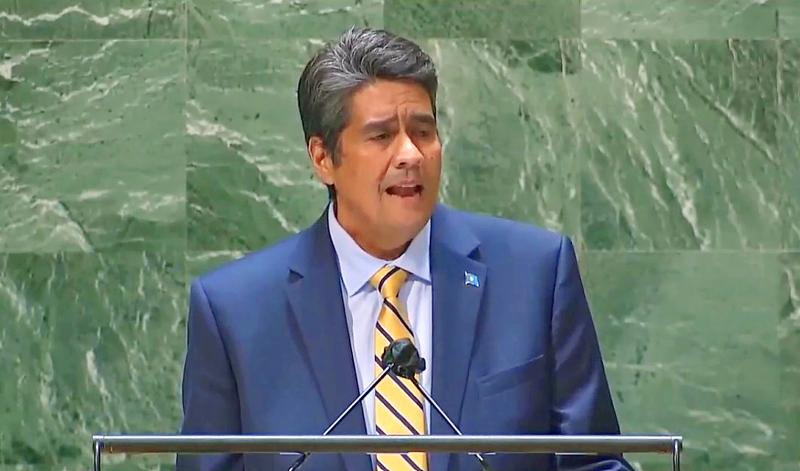Palauan President Surangel Whipps Jr on Tuesday called for Taiwan’s participation at the UN on the first day of the UN General Assembly’s 76th session in New York City.
In his 13-minute General Debate address, Whipps thanked Palau’s international allies for coming to its aid during the COVID-19 pandemic, in particular Taiwan, the US, Japan and Australia.
Their assistance — including donations of COVID-19 vaccines, personal protective gear and testing capacity — allowed Palau to remain “COVID-free and COVID-safe,” Whipps said.

Photo taken from the official UN Web site
More than 80 percent of Palau’s population has been fully vaccinated, and there have been no deaths or hospitalizations resulting from COVID-19, for which the people of Palau are forever grateful, he said.
The Palauan leader highlighted Taiwan’s leadership in the global response against the pandemic and its demonstration of “consistent and effective management of the pandemic within their borders,” efforts that extend to Palau.
“Taiwan’s international response facilitated cooperation and implementation of an effective sterile travel corridor between Taiwan and Palau,” the president said.
The sterile corridor, or “travel bubble,” has allowed the two nations to resume medical and educational cooperation, economic engagement and other benefits of international travel, he said.
“We encourage the UN system to accept Taiwan as a valuable contributor to our collective efforts and strongly advocate for Taiwan’s participation in the UN system,” he said.
With the world facing major challenges, Whipps used the analogy of a Palauan fish, the surgeonfish, to call for global unity.
“The surgeonfish represents a unique characteristic. They fish to graze and roam on the reef alone, eating algae, but once danger lurks, they all swim quickly from wherever they are along the reef and come together in a large school, resembling an intimidating ocean animal to provide safety and security for all,” he said.
He called on the international community to “act like the surgeonfish and come together, including Taiwan.”
“Taiwan’s 23.5 million people must also be given a voice as our UN Charter states,” he said.
“We the peoples of all nations working together can overcome the challenges of our time, from COVID to climate, and act with integrity and resolve to leave a better world for our children,” he said.
He was the first leader of Taiwan’s 15 diplomatic allies to speak at the General Debate, which finishes on Monday next week.
The presidents of Guatemala, the Marshall Islands and Honduras — three more of Taiwan’s diplomatic allies — were to speak at the General Debate yesterday.
Haitian Minister of Foreign Affairs Claude Joseph wrote of Haiti’s support for Taiwan’s inclusion in the UN system on Twitter.
“Faced with the challenges facing our world, in economic, security and health terms, we need a pooling of all forces. The Republic of Haiti reiterates its support for Taiwan’s reintegration into the UN,” Joseph wrote.
Minister of Foreign Affairs Joseph Wu (吳釗燮) wrote on Twitter: “Thank you @claudejoseph03 for choosing to #StandWithTaiwan. The government & people of #Taiwan are grateful for #Haiti’s staunch support of the country’s bid to participate in the @UN system via forums like #UNGA.”

The Central Election Commission has amended election and recall regulations to require elected office candidates to provide proof that they have no Chinese citizenship, a Cabinet report said. The commission on Oct. 29 last year revised the Measures for the Permission of Family-based Residence, Long-term Residence and Settlement of People from the Mainland Area in the Taiwan Area (大陸地區人民在台灣地區依親居留長期居留或定居許可辦法), the Executive Yuan said in a report it submitted to the legislature for review. The revision requires Chinese citizens applying for permanent residency to submit notarial documents showing that they have lost their Chinese household record and have renounced — or have never

A magnitude 5.6 earthquake struck off the coast of Yilan County at 12:37pm today, with clear shaking felt across much of northern Taiwan. There were no immediate reports of damage. The epicenter of the quake was 16.9km east-southeast of Yilan County Hall offshore at a depth of 66.8km, Central Weather Administration (CWA) data showed. The maximum intensity registered at a 4 in Yilan County’s Nanao Township (南澳) on Taiwan’s seven-tier scale. Other parts of Yilan, as well as certain areas of Hualien County, Taipei, New Taipei City, Taoyuan, Hsinchu County, Taichung and Miaoli County, recorded intensities of 3. Residents of Yilan County and Taipei received

Taiwan has secured another breakthrough in fruit exports, with jujubes, dragon fruit and lychees approved for shipment to the EU, the Ministry of Agriculture said yesterday. The Animal and Plant Health Inspection Agency on Thursday received formal notification of the approval from the EU, the ministry said, adding that the decision was expected to expand Taiwanese fruit producers’ access to high-end European markets. Taiwan exported 126 tonnes of lychees last year, valued at US$1.48 million, with Japan accounting for 102 tonnes. Other export destinations included New Zealand, Hong Kong, the US and Australia, ministry data showed. Jujube exports totaled 103 tonnes, valued at

BIG SPENDERS: Foreign investors bought the most Taiwan equities since 2005, signaling confidence that an AI boom would continue to benefit chipmakers Taiwan Semiconductor Manufacturing Co’s (TSMC, 台積電) market capitalization swelled to US$2 trillion for the first time following a 4.25 percent rally in its American depositary receipts (ADR) overnight, putting the world’s biggest contract chipmaker sixth on the list of the world’s biggest companies by market capitalization, just behind Amazon.com Inc. The site CompaniesMarketcap.com ranked TSMC ahead of Saudi Aramco and Meta Platforms Inc. The Taiwanese company’s ADRs on Tuesday surged to US$385.75 on the New York Stock Exchange, as strong demand for artificial intelligence (AI) applications led to chip supply constraints and boost revenue growth to record-breaking levels. Each TSMC ADR represents